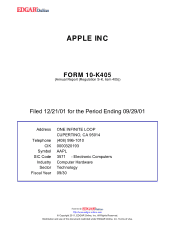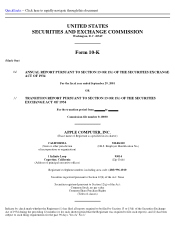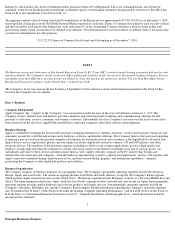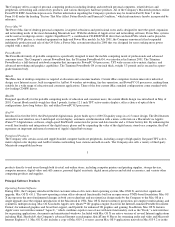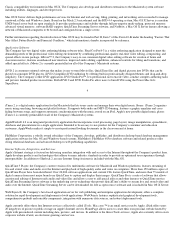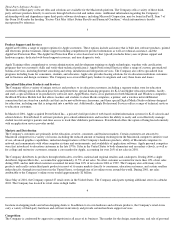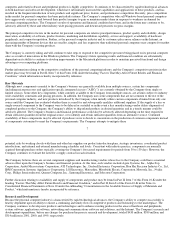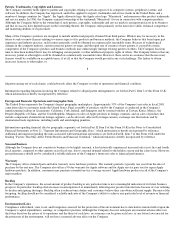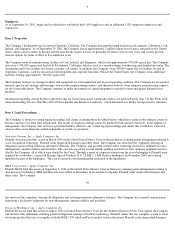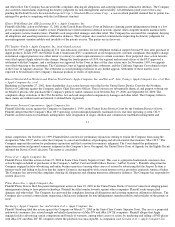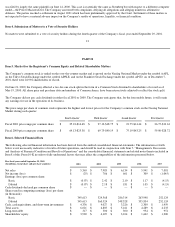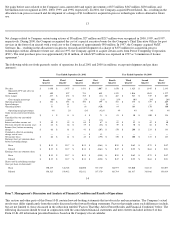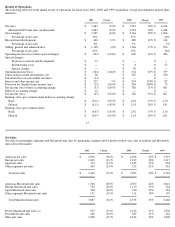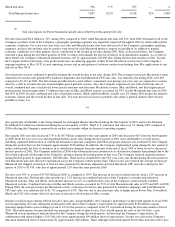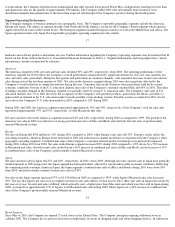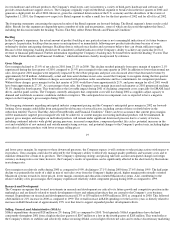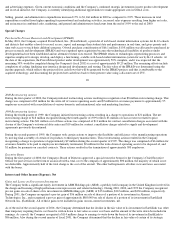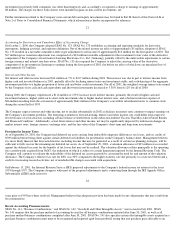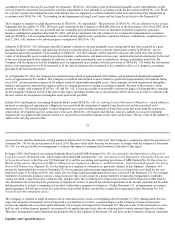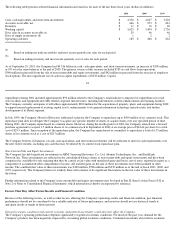Apple 2001 Annual Report Download - page 10
Download and view the complete annual report
Please find page 10 of the 2001 Apple annual report below. You can navigate through the pages in the report by either clicking on the pages listed below, or by using the keyword search tool below to find specific information within the annual report.
and other relief. The Company has answered the complaint, denying all allegations and asserting numerous affirmative defenses. The Company
also asserted counterclaims requesting declaratory judgment for non-infringement and invalidity. All defendants jointly moved for a stay
pending the Federal Circuit's decision in Datapoint Corp. v. Standard Microsystems Corp.
, a case in which plaintiff claimed that its patent was
infringed by products complying with the fast Ethernet standard.
Elonex IP Holdings Ltd., EIP Licensing, B.V. v. Apple Computer, Inc.
Plaintiffs filed this action on February 12, 2001 in the United States District Court in Delaware claiming patent infringement relating to a low
power consumption monitor standby system. Plaintiffs have filed numerous identical lawsuits against other computer monitor manufacturers
and computer systems manufacturers. Plaintiffs seek unspecified damages and other relief. The Company has answered the complaint, denying
all allegations and asserting numerous affirmative defenses. The Company also asserted counterclaims requesting declaratory judgment for
non-infringement, unenforceability and invalidity of the patents at issue. The parties are in discovery.
FTC Inquiry
–Prado v. Apple Computer, Inc. (and related actions)
In October 1997, Apple began charging all U.S. non-education customers for live telephone technical support beyond 90 days after purchase of
Apple products. In late 1997, the Federal Trade Commission (FTC) commenced an investigation into customer complaints that Apple's change
in technical support practices was either unfair or contrary to earlier representations to certain customers. Four purported class action lawsuits
were filed against Apple related to this change. During the fourth quarter of 1999, the regional and national offices of the FTC approved a
settlement with the Company, and a settlement was approved by the Court in three of the class action suits. In November 1999, two appeals
were filed objecting to the settlement. The California Court of Appeal upheld the settlement, and the California Supreme Court denied review
of the Court of Appeal's decision. The settlement is stayed pending resolution of any further appeals. Settlement of these matters is not
expected to be material to the Company's financial position or results of operations.
Hawaii Structural Iron Workers and Pension Trust Fund v. Apple Computer, Inc. and Steven P. Jobs; Young v. Apple Computer, Inc. et al; Hsu
v. Apple Computer Inc. et al
Beginning on September 27, 2001, three shareholder class action lawsuits were filed in the United States District Court for the Northern
District of California against the Company and its Chief Executive Officer. These lawsuits are substantially identical, and purport to bring suit
on behalf of persons who purchased the Company's publicly traded common stock between July 19, 2000, and September 28, 2000. The
complaints allege violations of the 1934 Securities Act and seek unspecified compensatory damages and other relief. The Company believes
these claims are without merit and intends to defend them vigorously.
Microware Systems Corporation v. Apple Computer, Inc.
Plaintiff filed this action against the Company on September 1, 1999, in the United States District Court for the Southern District of Iowa.
Plaintiff alleged that the Company's Mac OS 9 operating system infringed plaintiff's trademark for its real time operating system, OS-9.
Plaintiff asserted claims for trademark infringement, false designation of origin, dilution and common law trademark infringement and
11
unfair competition. On October 14, 1999, Plaintiff filed a motion for preliminary injunction seeking to enjoin the Company from using the
designation "Mac OS 9" and to order the Company to cancel and withdraw all packaging and advertisements that mention "Mac OS 9." The
Company opposed the motion for preliminary injunction and filed a motion for summary judgment. The Court denied the preliminary
injunction motion and granted summary judgment in the Company's favor. On appeal, the United States Court of Appeals for the Eighth Circuit
affirmed the District Court's decision. The matter is concluded.
Pierce et al. v. Apple Computer, Inc.
Plaintiff Pierce filed this action on June 15, 2000 in Santa Clara County Superior Court. This case is a purported nationwide consumer class
action brought on behalf of purchasers of the Company's AirPort Card and AirPort Base Station ("AirPort System"). Plaintiffs allege that the
Company engaged in false advertising and unfair business practices (among other causes of action) by advertising that the Airport System is
internet-ready and failing to disclose that the Airport System is incompatible with certain internet service providers, primarily America Online.
The Company has answered the complaint, denying all allegations and alleging numerous affirmative defenses. The Company has responded to
written discovery.
Pitney Bowes Inc. v. Apple Computer, Inc.
Plaintiff Pitney Bowes filed this patent infringement action on June 18, 2001 in the United States District Court in Connecticut alleging patent
infringement relating to laser printer technology. Plaintiff has filed similar lawsuits against other companies. Plaintiff seeks unspecified
damages and other relief. The Company has answered the complaint, denying all allegations and asserting numerous affirmative defenses. The
Company also asserted counterclaims requesting a declaratory judgment for non-infringement, unenforceability and invalidity of the patents at
issue.
Sternberg v. Apple Computer, Inc. and Gordon et al. v. Apple Computer, Inc.
Plaintiff Sternberg filed this action against the Company on March 17, 2000 in the Santa Clara County Superior Court. The case is a purported
nationwide consumer class action brought on behalf of purchasers of iMac DV and iMac DV SE computers. Plaintiff alleges that Apple
engaged in false advertising, unfair competition and breach of warranty, among other causes of action, by marketing and selling a DVD player
with iMac DV and iMac DV SE computers where the playback was unacceptable. A companion case,
Gordon et al. v. Apple Computer, Inc
.

